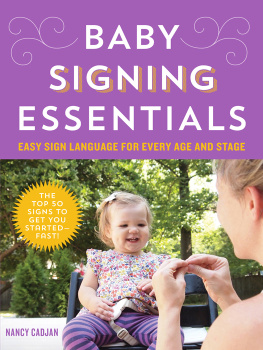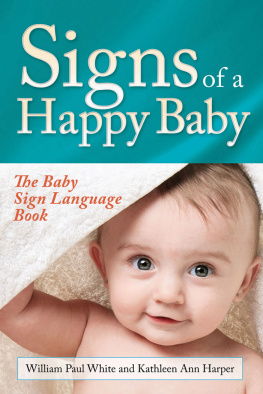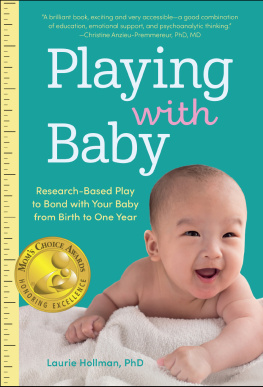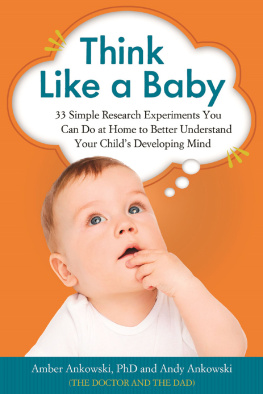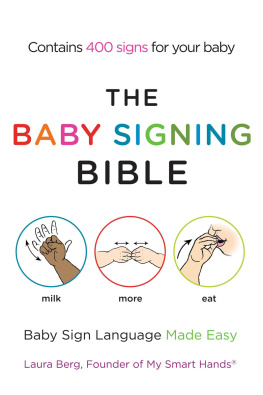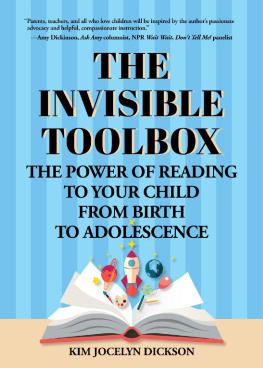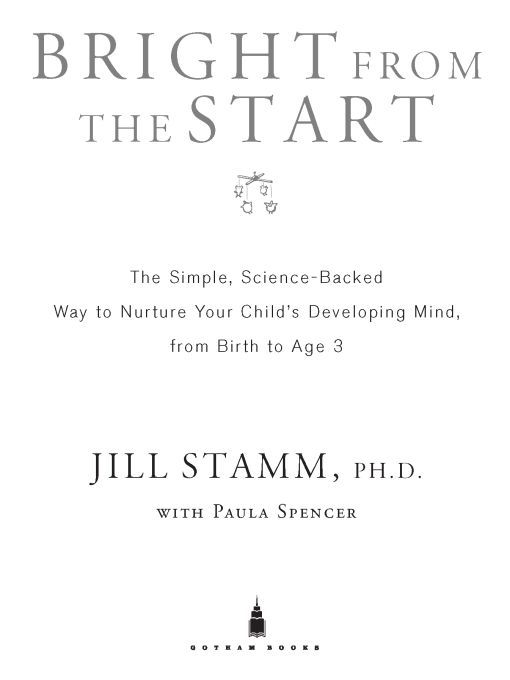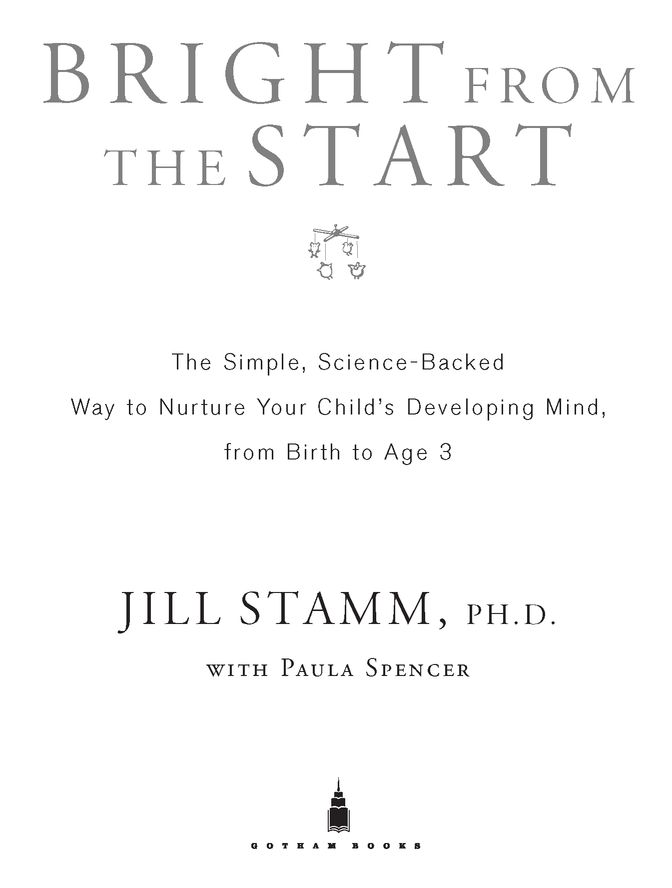Table of Contents
This book is dedicated to my daughters,
Jenny and Kristin
About This Book: What Babies Really Need Is Easy as ABC
Every day I hear questions that reveal just how much parents care about raising a child with a bright future:
Should I really read to my baby? What kind of toys do babies need? Can teaching a baby sign language really boost IQ? How should my caregiver be stimulating my baby? Should I enroll my toddler in foreign language lessons? Is all TV bad, or only some TV? Should I pipe classical music into the nursery?
These are fairly new concerns. While mothers and fathers have always dreamed of their children growing up happy and successful, until very recently most of us, because we believed that intelligence was only inherited, did not spend our time and resources concerned about our role in influencing IQ. A childs potential was therefore thought to be pretty much predetermined. Today, we know differently.
Thanks to new technologies that make it possible to safely see inside a living, working brain, the medical world now knows that a huge amount of the brains functioning and capacity develops after birthand that a baby or toddlers early experiences can greatly influence his or her future learning potential.
Every baby living in the twenty-first century, whether born with impairments or bound for Harvard, deserves parents who have an awareness of the basics of how a young brain naturally grows. Its the foundation for all of the other things weve long been taught to pay attention to in babies and young children, including physical milestones, social-emotional development, and speech. As a parent, being mindful of brain development from birth can significantly impact your childs future success in academics and in life.
This book will help you separate the myths about early brain development from the facts and show you simple but effective ways to nurture your babys remarkable growing mind.
FIRST, BEWARE OF THE HYPE!
Were living in an exciting age of discovery about the infant brain. Cutting-edge neuroscientific research is challenging some old assumptions and helping to prioritize the importance of others. Knowledge about young childrens minds is no longer based only on behavioral observations or on studies of injured brains and postmortem tissue. Now we have dramatic, concrete evidence about how typical brains develop. Scientists themselves are amazed by what theyre discovering, particularly about how early the brain wires up for learningfar sooner than was previously assumed.
Unfortunately, as news of these findings has trickled into parents lives, accurate and practical applications have been slower to follow. Media outlets, for example, are full of headlines about every latest brain-science study. Maybe you caught a segment on your favorite morning TV show about love-deprived Romanian orphans or noticed moms in an online chat group discussing the music-intelligence link. Time and Newsweek have devoted splashy cover stories to the infant brain. And what parent hasnt seen the loads of products in every baby store and catalog that promise to create engaging learning opportunities, stimulate cognitive development, or provide brain-building fun? Edu-tainment has become a $600 million business, with more than $100 million alone devoted to developmental videos and DVDs produced specifically for infants and toddlers.
The trouble is, headlines and ad slogans are often misleading. Many of the things were currently doing for babies arent accomplishing what we think they are. And we dont necessarily know what they are doing. What we do know is that families are spending a lot of money and energy on these efforts. Meanwhile, other activities with clear-cut evidence to support them are missed or discounted because parents arent yet aware of their importance.
I see many different reactions to the baby brain boom. For every mom or dad who feels stressed about keeping up with all the latest brain-building trends, theres one who hears words like brain science and infant stimulation and simply tunes out. Others still believe that its all in the genes and how you interact with a baby doesnt much matter. Im often asked, A good preschool or kindergarten is the main thing, isnt it?which reveals the popular line of thinking that learning happens mostly in the school years.
Whether a parent undervalues the importance of brain development, overcompensates, or falls somewhere in between, theres a nagging sense of guilt: Is this enough? Is it right? What if my child falls behind? Tell me, Dr. Stamm, what is it that I am supposed to be doing?
Finding accurate, practical answers has been surprisingly tricky for parents. Few pediatricians have the time to dispense brain-development advice alongside their recommendations for feeding, sleep, and safety. Baby-care guides tend not to dwell on brain science or they dont include the topic at all. Though you can find lists of developmental milestones and expectations for different ages and stages, these always emphasize changes in the child, not the environment thats influencing her. News reports barely have time and space to explain the experiments, let alone interpret their findings in a way that helps you make sense of the latest crazes and decide how you want to spend your time, money, and energy with your baby. Although there is no end to suggestions about parenting techniques, important explanations about why you might want to do one thing over another are not available. The urgent sales descriptions you read on all those brainy toys and potty chairs with lights and sounds were written by advertising agencies wanting to sell products, not by neuroscientists who understand firsthand the facts about brain function.
THE BRAIN TRUTH: WHAT BABIES AND TODDLERS REALLY NEED
This book will help to ease your concerns by bringing neuroscience from the laboratory into the nursery. Ill explain how scientists are discovering new information about infants and toddlers, the implications that can be drawn from such knowledge, and how you can use these science-backed insights to shape your own interactions with your child.
What the science tells us is this:
1. What babies need is simpler than you might think.
2. But they need it more consistently and earlier than we often provide it.
3. My recommendations for early care are within every parents ability to provide, regardless of your resources.
4. In fact, theyre as easy to learn as ABC. The cornerstones of what a bright, happy baby or toddler needs are Attention, Bonding, and Communication.
Lets look at each statement more closely:
What Babies Need Is Simpler Than You Might Think


